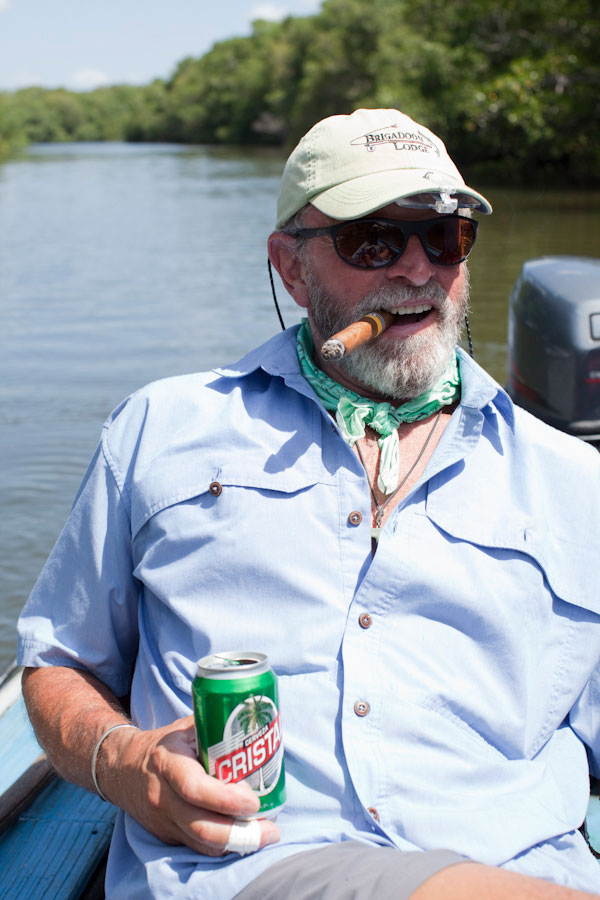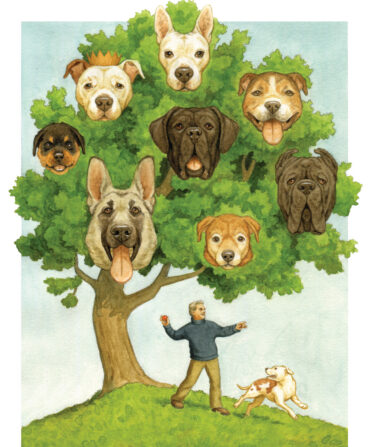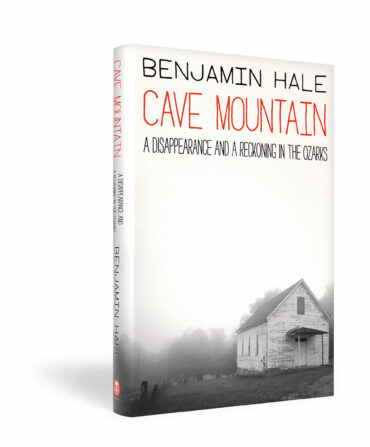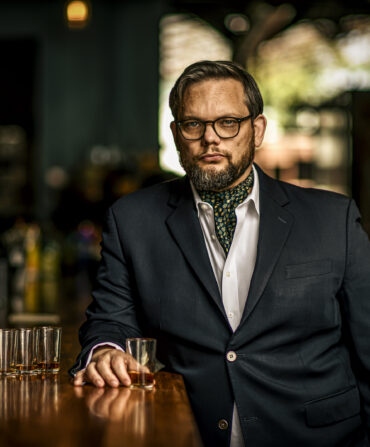After more than seven decades, most of them spent with a rod in his hand, Charles Gaines has learned the most difficult fishing lesson of them all—to slow down and enjoy it. The Birmingham, Alabama-based author’s latest book, Waters Far and Near: Tales of Angling Misadventure Around the World, is available now. Here, he shares more wisdom—about bonefishing in Cuba, Florida’s Forgotten Coast, and life on and off the water.
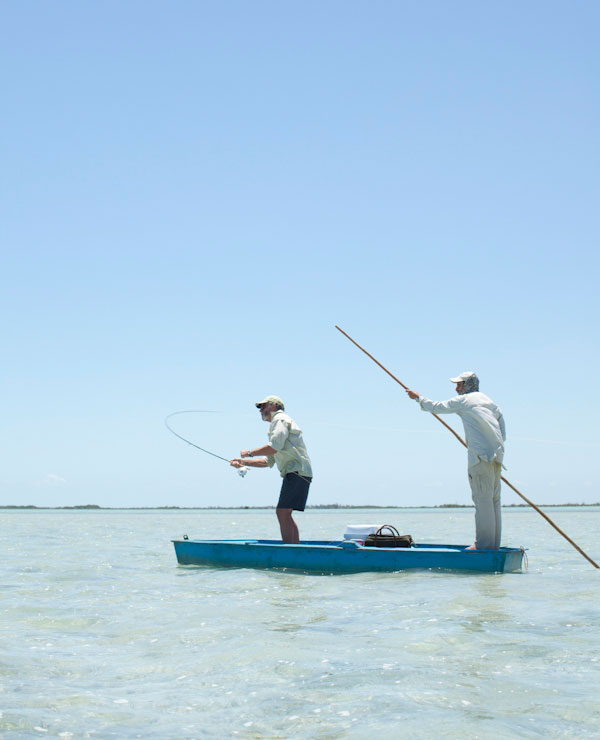
Photo: Eric Kiel
Gaines casts from a Cuban flats boat.
If you could hop on a plane and go to any of the places you’ve ever fished right now, where would it be?
Can I give you two?
There’s an island off the beaches of Abaco in the Bahamas called Duck Cay. You’re wading on perfectly white sandy bottom with the palm trees swaying in the breeze and the open Atlantic out in front of you. Its blue waters are full of really big, smart, educated bonefish.
The other would be the Traful River in Northern Patagonia, Argentina. It’s an eight-mile river owned on one side by Ted Turner and on the other side by an old friend named Meme Lariviere. She has the finest fishing lodge on the planet. Period. On any cast you can hook a landlocked salmon, a rainbow or a brown—all over ten pounds.
It’s becoming easier to travel to Cuba. What has your experience been like fishing there?
Flats, blue water fishing, and bass fishing—all of them are wonderful in Cuba and very few Americans get down there to do it. It’s going to be a phenomenal resource for American anglers. That’s the good news. The bad news is that it’s very quickly going to become Miami Beach.
You’re worried the country will change with more visitors?
In a very short period of time it’s going to become like every other place in the Caribbean, just built up to the nines. Castro realized thirty or forty years ago that sport fishing was much more valuable to his economy than commercial fishing. So he set aside huge—I mean vast—tracts of fishing areas and made them into parks where no commercial fishing is allowed. The bonefish and permit have come back like gang-busters. He is—in terms of preserving fisheries in his native state—the biggest environmentalist in all of the Caribbean.
We face the struggle of crowds close to home—like the “Gone Florida” you write about. What did you mean by calling it that?
I grew up in Florida. I was born in Jacksonville seventy-three years ago and my father started taking me down to the Florida Keys when that was still a relatively undiscovered fishery. In the 1950s we were using glass rods and Medalist reels and hand-tied flies and nobody really knew what they were doing. There were only a handful of guides and a handful of anglers.
Once there was no such thing as a jet ski, those awful little inventions that ruin the flats and make all kinds of hideous noise. Those halcyon days are gone, baby gone.
Is there anywhere you would still consider that old, preserved Florida?
One of the stories in the book is about the area around Apalachicola, which they call the Forgotten Coast. And for some totally mysterious reason, that coast has never seen the kind of development that has, to my mind, ruined the rest of Florida.
RELATED: FLY FISHING’S ALL-STAR CAST
What have you learned by fishing with your family, and especially your daughter, a talented outdoorswoman?
Both my boys are excellent fishermen, but my daughter is the one who inherited that gene. She’s an intense fisherman, she’s a very good fisherman, and she’s an all-day fisherman. You get out in the boat and if it’s hot or windy or rough or whatever, she’s there for the day, buddy. She’s not going anywhere. I love that about her.
There is a lot of macho bullshit associated with outdoor sports. Maybe it’s because I’ve gotten old, but I’ve run out of patience for that particular form of fishing, which is very aggressive, very competitive, gear crazy, and always about who catches the biggest or the most fish. Women tend to bring to it more curiosity, and more enjoyment of the environment and the experience.

Cuba’s Zapata Peninsula is surrounded by pristine blue water where bonefish thrive.
For some people it’s fishing, for others it might be golf or running. You’re saying once you do something for a long time, you realize the competition isn’t as important?
That’s exactly right. The competition abrades away the experience like a piece of sandpaper that sands off all the valuable corners. I can remember whole days of competitive fishing where I never noticed where I was. I’d be floating that stretch of the Snake River that runs near Jackson Hole, Wyoming. You’ve got the Tetons soaring up above you and all kinds of wildlife. I can remember coming home and not remembering a single thing I saw other than the water and the fly and the fish. That’s not right.
There are stages that anglers go through. When you first start to fish, it’s all about numbers. And then you get a little more sophisticated and it’s all about size. Then the third stage is you only want to catch the pickiest fish. And then the next stage, you don’t care about the numbers, you don’t care about the size, you don’t care about the technical difficulty, you care about the experience. You care about the company, the place, and the beauty of the water you’re on.
Do you like being in this stage, then?
I wouldn’t swap it for any of the other stages. It’s spiritually gratifying. Fishing is like asking some gigantic question of the universe. Every time you throw your fly out there, that’s a question. The bite of the fish is the answer.

Gaines’ latest book is available today.
More by Charles Gaines
>Fly Fishing’s All-Star Cast
>Exploring Havana, Cuba
>Southern Master: Chef Frank Stitt
CJ Lotz Diego is Garden & Gun’s senior editor. A staffer since 2013, she wrote G&G’s bestselling Bless Your Heart trivia game, edits the Due South travel section, and covers gardens, books, and art. Originally from Eureka, Missouri, she graduated from Indiana University and now lives in Charleston, South Carolina, where she tends a downtown pocket garden with her florist husband, Max.
Garden & Gun has affiliate partnerships and may receive a portion of sales when a reader clicks to buy a product. All products are independently selected by the G&G editorial team.


